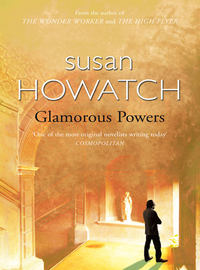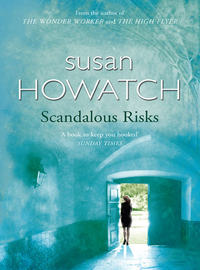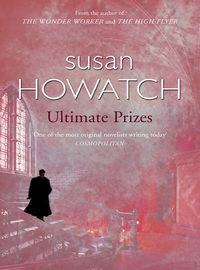
Полная версия
Glittering Images
I paid the Bishop a suitable compliment and was glad I did not have to be insincere for the sake of politeness. We walked through the porch on to the sward. Beyond the wall of the churchyard the houses of the Close basked in the sun and a horse was drawing a milk-cart slowly along the North Walk. I could hear the birds singing in the cedar tree nearby.
‘I must confess the Bishop intrigues me,’ I said idly at last. ‘What would you say was the fundamental nature of his belief? God-centred? Christ-centred? Rooted in the Trinity?’
‘Well, it’s all those things,’ said Harvey, ‘but I suppose he’s fundamentally Christocentric. He has an overriding belief not just in Christ’s compassion and forgiveness but in Christ’s honesty and truth, and that’s why he can’t bear hypocrisy – he sees it as a re-enactment of the Pharisees’ behaviour in the Gospels and he feels called to attack it just as Our Lord did.’ He shot me a shy glance. ‘Please forgive him for last night,’ he said rapidly. ‘He didn’t mean to hurt you. He just misjudged your sincerity – I think he suspected you’d only adopted your point of view out of loyalty to Dr Lang and of course he was wrong, but anyone can make a mistake, can’t they, and he really is the most wonderful man, absolutely the best, believe me.’
I realized belatedly that he had sought my company in order to defend his hero, and I knew I should signal that I was willing to be convinced of Jardine’s heroic qualities. I said with interest, ‘He’s been good to you?’
‘That’s an understatement!’ In his enthusiasm Harvey became confidential. ‘When I was at the Cathedral School at Radbury my parents died and Dr Jardine – he was Dean of Radbury then – simply took me over, paid my school fees, had me to stay in the holidays – and it wasn’t as if I was one of those appealing children who look like angels and win all the prizes. Then later when I wanted to be ordained I wasn’t sure whether I’d be able to pass the exams but Dr Jardine just said, “Nonsense, of course you can!” and when he offered to coach me in his spare time I knew he really believed I could do it. I’d never have passed if it hadn’t been for him, and afterwards when he asked me to be his chaplain … Well, you can imagine how I felt! Of course I was terrified I’d be no good and in fact I’m sure he could get someone better, but I try very hard and I seem to muddle through somehow.’
‘I’m sure you do very well.’ It was impossible not to be touched by his honesty, and suddenly I knew why he had appealed to Jardine.
Meanwhile our conversation had taken us through the palace gateway and I was rapidly framing some questions which would take advantage of his confidential mood. ‘Tell me about life at the palace,’ I said. ‘Miss Christie evidently has an important role in the household – she seems very close to Mrs Jardine.’
‘Oh, Mrs Jardine thinks of her as a daughter, I know she does.’
‘How does she get on with the Bishop?’
‘People always want to know that,’ said Harvey, pausing to extricate his latchkey as we approached the front door, ‘and they’re always surprised by my reply which is: “Better than they used to” and not the expected “Magnificently well”.’
‘There’s been friction?’
‘Well, not exactly friction … but they’ve had their cool spells. The first was after she came to Radbury – that was around the time I started staying with them in the holidays – and then there was a second cool period after they arrived in Starbridge five years ago. I remember saying to Lady Starmouth once that I was afraid Lyle might leave if the Bishop became much cooler, but Lady Starmouth told me not to worry. She said it’s not always easy for a married couple to live in close proximity to a third party, and of course Lyle’s much more involved with both the Jardines than I am. I’m fairly peripheral in their private life, even though I see so much of the Bishop in his professional role.’ He finally found his latchkey but when the front door swung open it became wedged against a pile of envelopes. ‘Heavens above, look at all this post!’
‘Is this abnormally substantial?’
‘Yes, we’re still dealing with the correspondence on the A. P. Herbert Bill. We even had to engage additional secretarial help last week,’ said Harvey, becoming flustered at the memory, and bustled away into the library as if he feared the envelopes might multiply in his hands.
I made a mental note to ask Lady Starmouth about the difficulties of a married couple obliged to live in close proximity to a young and attractive third party. Then I retired to the dining-room in pursuit of breakfast.
II
I was early. I found no one in the dining-room, but the morning papers were laid out on a side-table and I began to browse among the cricket reports in the Daily Telegraph. I was still digesting the unfortunate news that Oxford had defeated Cambridge by seven wickets when Jardine walked in.
‘I was glad to see you at the service,’ he said after we had exchanged greetings. ‘I was glad to be there myself. Sometimes one so strongly needs to wipe the slate clean in order to come fresh to a new day.’
There was a pause while we both thought of the dinner party, its unhappy memory now purged from our consciences, and before either of us could speak again the Starmouths entered the room. They were followed by Miss Christie, immaculate in a navy-blue skirt and white blouse, and at once I noticed the discreet, perfectly proportioned curves of her figure above the waist; I even found myself toying with the erotic image of a pair of empty champagne glasses.
‘Good morning, Dr Ashworth,’ she said formally, while I was grappling with these most unclerical thoughts, but the next moment she was turning to Jardine. ‘Carrie’s decided to stay in bed for a while, Bishop, and she’s asked me to have breakfast with her.’
The Bishop showed no surprise but Lady Starmouth inquired in alarm if Mrs Jardine were unwell. Miss Christie, however, had already retreated to the hall and it was left to Jardine to answer idly as he turned a page of The Times, ‘It’s merely the aftermath of insomnia. At two o’clock this morning, acting out of a strong sense of self-preservation, I was obliged to retire to my dressing-room in order to resume the bliss of unconsciousness. The chief disadvantage of Carrie’s insomnia is that she’s always overcome with the urge to share it with me.’
My immediate reaction was to reflect that Jack had been right in assuming that the Jardines still shared a bedroom. My second reaction was to accuse myself of becoming more prurient than any reporter from The News of the World, and in an effort to beat back all thoughts which were unbecoming to a clergyman I began to consider how I should spend my morning. I would have to go to the library; it would look too odd if I postponed my encounter with the St Anselm manuscript, but I thought I could use the fine weather as an excuse not to linger indoors. During breakfast the Earl announced his intention of fishing in the river at the bottom of the garden while the Countess confessed an urge to paint a watercolour of the long herbaceous border, and I thought both of them might be in the mood for a little casual conversation about our host.
‘Do you have any special plans for this morning, Mrs Cobden-Smith?’ I asked as I finished my eggs and bacon.
‘Oh, I shall write some letters, go to the shops, “fill the unforgiving minute”, as Kipling would say …’ Mrs Cobden-Smith spoke with such energy that I immediately felt exhausted. ‘Willy will take George for a walk –’ The St Bernard looked hopeful as his name was mentioned ‘– and then … What are you going to do after that, Willy?’
‘Nothing, I hope,’ said Colonel Cobden-Smith.
‘Good man!’ said Lord Starmouth.
‘Well, at least the clergy are preparing for a morning of unremitting toil,’ said Lady Starmouth, and gave me yet another of her radiant sophisticated smiles.
III
The most notorious fact about the work which passes under the name of The Prayers and Meditations of St Anselm is that it is uncertain how much of the material can be attributed to St Anselm himself. In 1932 Dom Wilmart had ascribed nineteen of the prayers and three of the meditations to the saint, who had been Archbishop of Canterbury at the time of William Rufus, but the matter was still of interest to scholars and much of the interest had always centred on the Starbridge manuscript which showed the work before the insertion of many of the additions.
After the required exchange of courtesies with the librarian I embarked on my reading. The manuscript was written in a clear hand which I mastered without trouble, but there were slips in the Latin which indicated that the scribe might have been a young monk who suffered from wandering attention. To support this thesis I found some entertaining embellishments in the margin, in particular a sketch of a prancing cat with a mouse in his mouth, and I thought how odd it was that this manuscript, perhaps regarded as no more than a tedious copying chore by its scribe, had survived to become a document of profound importance. The young monk had been dead for centuries but his work for God lived on; idly I speculated how I might introduce the subject into a future sermon, and at once I thought of the famous text from Isaiah: ‘The grass withereth, the flower fadeth but the Word of Our God shall stand for ever’.
I took notes for over an hour as I compared the text with my copy of Wilmart’s book, and then leaving the library I returned to the palace, parked my briefcase in the hall and strolled outside again into the garden.
I saw Lady Starmouth at once. She was sitting on an artist’s folding stool, her sketchpad in her lap, and gazing meditatively at the long border which stretched downhill in a blaze of colour towards the river. When she saw me she smiled, beckoning me to join her, and as I crossed the lawn I could see the Earl fishing in the distance by the willows.
‘I thought it was going to be a watercolour?’ I said as I saw the pencil in her hand.
‘I always do a rough sketch first and I’ve only just begun – I’ve been chatting to poor Carrie.’
‘Is she better?’
‘Yes, but still distressed about that ghastly scene last night. I’m afraid that sometimes she’s much too sensitive for her own good and never more so than when the conversation turns to lost babies … Did you know about the Jardines’ child?’
‘Dr Lang only mentioned that they had no children living. What happened?’
‘Am I being given the chance to gossip about the Bishop? Yes, I am – how delightful! Do sit down, Dr Ashworth, and help me postpone the dreaded moment when I have to open my paintbox and pretend to be an artist!’
To encourage her I said, ‘If you’re in the mood to gossip, I’m certainly in the mood to listen – after my clash with the Bishop last night I find I’m gripped by a curiosity to know more about him.’
‘In the circumstances,’ said Lady Starmouth drily, ‘I’d say curiosity was an admirably charitable reaction. Now let me see, shall I launch straight away into the saga of the baby or shall I begin with Jardine’s arrival in Mayfair? I warn you, I’m rather a menace when I start talking about the Bishop because I find him so intriguing that I tend to prattle away happily for hours.’
‘I’m sure you never prattle, Lady Starmouth – I can only imagine you discoursing alluringly!’
She laughed. ‘How wonderful to have such a flattering audience! Very well, let me try to discourse with all the allure at my command!’
Lounging on the lawn beneath the hot sun I prepared to give her my fullest attention.
IV
‘Jardine’s had the most unusual life,’ said Lady Starmouth. ‘I’m not sure how much you already know about his career, but twenty-one years ago in 1916 he was promoted from an obscure chaplaincy in North London to St Mary’s, Mayfair – and of course that’s one of the smartest parishes in the West End. Henry and I did our best to welcome the new vicar, and because he was unmarried I made a special effort to introduce him to suitable girls. Did you know Jardine married late? He was thirty-seven when he met Carrie, but before the move to St Mary’s he couldn’t afford a wife. Unfortunately he had a most peculiar father who had wound up heavily in debt, and Jardine had to support the family on his small stipend.’
‘Someone mentioned a peculiar father –’
‘The whole family,’ said Lady Starmouth confidentially, ‘was most odd. In addition to the peculiar father there was a very strange Swedish stepmother and two sisters, one of whom went mad –’
‘This sounds like a Jacobean tragedy.’
‘No, they didn’t all kill each other – unfortunately – but you’re right to relate it to literature. It was like a novel by Gissing about the ghastliness of genteel poverty.’
‘Were the Jardines so genteel? What did the peculiar father do for a living?’
‘Nobody knows. In fact I’ve never plumbed the depths of Jardine’s lurid family background because he prefers not to talk about it, but the sister – the one who didn’t go mad – was painfully genteel, poor thing, a very refined accent and a ghastly way with a teacup – and my guess is that they were all upper-working-class but trying to be lower-middle. God, how crucified so many people are,’ said the aristocratic Lady Starmouth carelessly but with genuine feeling, ‘by the English class system.’
‘Did the whole family accompany Jardine to Mayfair?’
‘No, the peculiar father and the mad sister were dead by that time, but Jardine moved into the vicarage with his surviving sister and his sinister Swedish stepmother and immediately began to cast around for a wife –’
‘– whom you obligingly provided for him!’
‘Not quite! But I did go to the dinner party where he and Carrie met for the first time. The meeting was wildly romantic, love at first sight, and four days later he proposed.’
‘Four days?’
‘Four days,’ said Lady Starmouth, enjoying my astonishment. ‘Carrie’s family were in a tremendous tizzy, of course, because of Jardine’s odd background, but on the other hand he had this stunning position as Vicar of St Mary’s and that made it hard to object to him as a suitor.’
‘Did the family make trouble?’
‘They somehow managed to restrain themselves. I suspect it was because Carrie wasn’t so young any more and the family had begun to worry that she might wind up on the shelf.’
‘It’s hard to imagine someone as pretty as Mrs Jardine winding up on the shelf.’
‘True, but one of the cruellest facts of life, Dr Ashworth, is that men prefer pretty women to be under thirty. After that women need to rely more on other resources.’
I sensed the implication that Mrs Jardine had no other resources on which to rely, but all I said was, ‘So nothing impeded Dr Jardine’s stampede to the altar?’
‘On the contrary, the Swedish stepmother then made a scene and said she wouldn’t live in any house where Carrie was mistress. So she retired with the poor plain sister to a flat in Putney – which Jardine had to pay for, of course.’
‘But surely wasn’t this a good thing? Isn’t it better for a woman to start married life without a stepmother-in-law breathing down her neck?’
‘Of course. Carrie was thrilled. But Jardine was dreadfully upset. He adored this stepmother, although God knows why – she was twenty years older than he was and she weighed sixteen stone and she had very pale eyes and a very thin mouth and she spoke with a very heavy foreign accent – oh, she was sinister, she really was! After the row I thought she’d refuse to come to the wedding but she turned up looking wrathful – what a deathshead at the feast! The poor sister was hardly cheerful either – she wept throughout the service, but at least she was only crying out of sentimentality. I liked the sister. Poor thing, what a wretched life she had! She died of cancer eventually, of course. I say “of course” because she was the sort of person who inevitably dies of something beastly … But I must stop digressing. You’re being wonderfully patient, Dr Ashworth, but I really am getting to the baby now, I promise –’
‘Don’t apologize, Lady Starmouth. I’m enrapt by the sinister stepmother.’
‘Well, after the wedding she sank into darkest Putney, thank God, and the Jardines floated off on their honeymoon. When they came back Carrie immediately started planning the nursery, so of course we all thought … But nothing happened. However finally the baby started. We were all so relieved, and no one was more relieved than Jardine – apart from Carrie herself, of course. He started talking to Henry about which schools the child should go to and Carrie started adding the finishing touches to the heavenly nursery – oh, what a mistake it is to count one’s chickens before they’re hatched! Eventually the worst happened and the baby – a boy – was born dead.’
Lady Starmouth paused as if to choose her next words with care. ‘I wonder how I can convey to you how dreadful this was for the Jardines. Of course a dead baby is always a tragedy, but in this case … You see, Carrie was so absolutely sure that her one talent was for motherhood. It’s not easy for any woman to be married to a brilliant man and Carrie thought that motherhood would give her the chance to excel in a way which would command Jardine’s very special respect. And Jardine himself was longing for a family. He wanted to recreate the family life which he could remember existing before his mother died – a life which he’d almost certainly idealized but which represented to him some intensely desirable goal of domestic bliss. So both he and Carrie were united by these very urgent and powerful dreams – and that was why it was so terrible when the stillborn child tore those dreams apart.’
She paused again and I allowed the silence to lengthen to signal my sympathy before I asked, ‘There were no other children?’
‘No, and in a way that was the ghastliest part of all because no doctor could tell her why nothing happened. So she went on hoping and so did he – in fact Alex once told me he went on hoping until … well, until no hope was possible any more. There! I’m calling him Alex – very improper, isn’t it, to call a man by his Christian name when he’s not a member of one’s family, but I’ve known him so long now and we’re such good friends and Henry doesn’t mind if I call Jardine “Alex” occasionally … I expect you’ve wondered about my friendship with the Bishop, haven’t you!’ she added, giving me an indulgent smile. ‘Perhaps you’re even a little shocked!’
‘Not at all, I’m deeply envious! I’ve heard about Dr Jardine’s so-called Lovely Ladies, and obviously you’re the Lovely Ladies’ Leader!’
She laughed. ‘I simply must add you to my clerical collection!’ she said. ‘You’re such an exceptionally charming listener!’
‘I could listen to you indefinitely, Lady Starmouth. Tell me more.’
She sighed. ‘It really is too dreadful how little encouragement I need … But what shall I tell you next? I’ve told you about the ghastly background and the romantic marriage and the stillborn child –’
‘Strike a lighter note,’ I said, ‘and tell me about Dr Jardine’s Lovely Ladies.’
V
‘Of course Alex has numerous acquaintances among the opposite sex,’ said Lady Starmouth, adding another line to the obscure pattern on her sketchpad, ‘but there are only three of us who could truly be described as friends. We all met him in 1916 during his first year as Vicar of St Mary’s.’
I was immediately intrigued. ‘Why was he so prone to friendship in 1916?’
‘Moving to Mayfair was a huge change for him, and at first he was very lonely and unsure of himself.’
‘Who are the other two ladies?’
‘Sybil Welbeck and Enid Markhampton. Alex liked us because we were all absolutely safe – happily married, churchgoing women, firmly anchored to the conventions … Heavens, how dull that sounds! But we’re all tolerably amusing, I promise you –’
‘You hardly need to assure me of that, Lady Starmouth, but what amazes me is Dr Jardine’s luck in finding three safe Lovely Ladies all at once! Did he never add to his collection?’
‘No,’ said Lady Starmouth, examining the point of her pencil. ‘He didn’t.’
‘Was that because he felt you were all so incomparable that no other woman was fit to join your ranks?’
We laughed before Lady Starmouth said easily, ‘He married soon after he met us, and perhaps he was afraid Carrie wouldn’t take too kindly to any new close friends of the opposite sex.’
‘Speaking as a clergyman,’ I said, ‘I find the whole idea of close friendships with married women fraught with the most hair-raising possibilities.’
‘Ah, but you’re of a different generation, aren’t you?’ said Lady Starmouth. ‘Such friendships may seem strange now but when I was young they weren’t so unusual. The War changed so many things, and one of the first casualties of the new freedom afterwards was the concept of the amitié amoureuse.’
‘Nevertheless I can’t help thinking that if I’d been Dr Jardine I might have had a hard time preventing myself from falling in love with one of you.’
Lady Starmouth gave another indulgent smile but answered seriously, ‘I can assure you that Alex has never been in love with either Enid or Sybil or me. At the risk of sounding horribly snobbish, I’ll say that we’re not in the league which he would consider accessible as far as the ultimate intimacies are concerned.’
I was again much intrigued. ‘I’m not sure I understand you,’ I said, wondering how I could lure her on over such delicate ground, but Lady Starmouth had no need to be lured. I had forgotten that the aristocracy, unlike the middle classes, fail to find the subject of sex embarrassing.
‘When Alex was growing up,’ she said, ‘the women in his life were – at most – lower-middle-class. Then his years up at Oxford gave him enough confidence to marry an upper-middle-class girl like Carrie Cobden-Smith. But I think if he’d been offered the chance of deep intimacy with someone from the aristocracy, he’d have backed away. He’d have found the prospect too intimidating.’
I knew at once that this was a vital detail in the portrait I was constructing of Jardine. The Bishop was safe with his Lovely Ladies, not necessarily because of any indestructible virtue on his part, but because there was a psychological barrier keeping him in check. Jardine would be aware of this; a clergyman is taught to know himself well so that he may learn the best way to control his weaknesses and Jardine, liking the company of the opposite sex, would only have trusted himself with women whom he felt were ultimately beyond his reach.
‘Talking of lovely ladies,’ said Lady Starmouth, adding another line to her sketch, ‘have you fallen in love with Miss Christie?’
‘Miss Christie!’ I was so startled that I sat bolt upright.
‘I saw the smouldering looks you were giving her in the drawing-room last night. My dear Dr Ashworth, will you allow me to take advantage of my numerous years of seniority by giving you some friendly advice? Don’t bother with Miss Christie. She’s spent the last decade proving she’s quite uninterested in men.’
I said lightly, ‘She doesn’t nurse a secret passion for the Bishop?’
‘I suspect it’s much more likely she nurses a secret passion for Carrie.’
I exclaimed appalled, ‘But that’s impossible!’
‘My poor Dr Ashworth, you are smitten, aren’t you! Of course I’m not implying the passion’s reciprocated – Carrie adores Alex. But you tell me this: why is an attractive intelligent girl like Miss Christie content to remain as a companion when she’s had numerous proposals, some of them from very eligible men?’
I said suddenly, ‘How do the Jardines explain Miss Christie’s continuing spinsterhood?’
‘Well, the official story is that she suffered a broken engagement before she met them, and that this left her perpetually disenchanted with the opposite sex. But I find that hard to believe – Miss Christie strikes me as the sort of woman who would consider it a matter of pride to recover completely from a broken engagement.’






